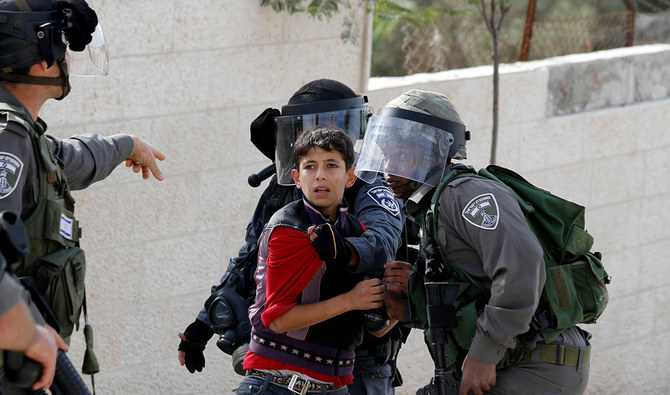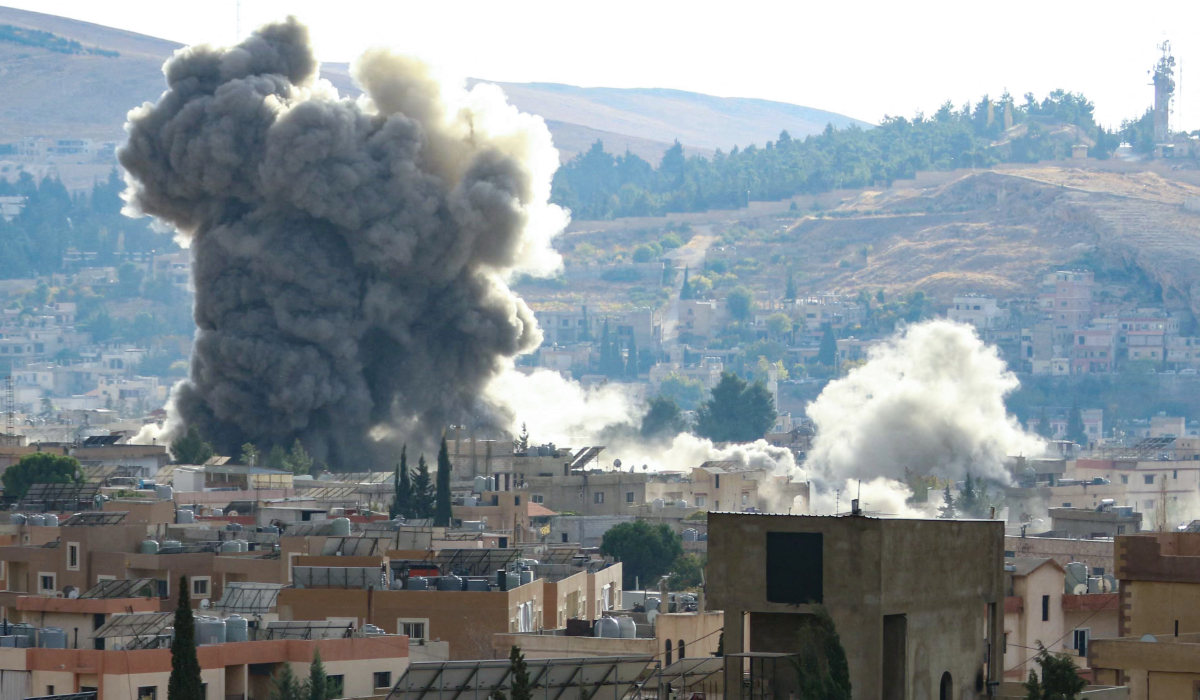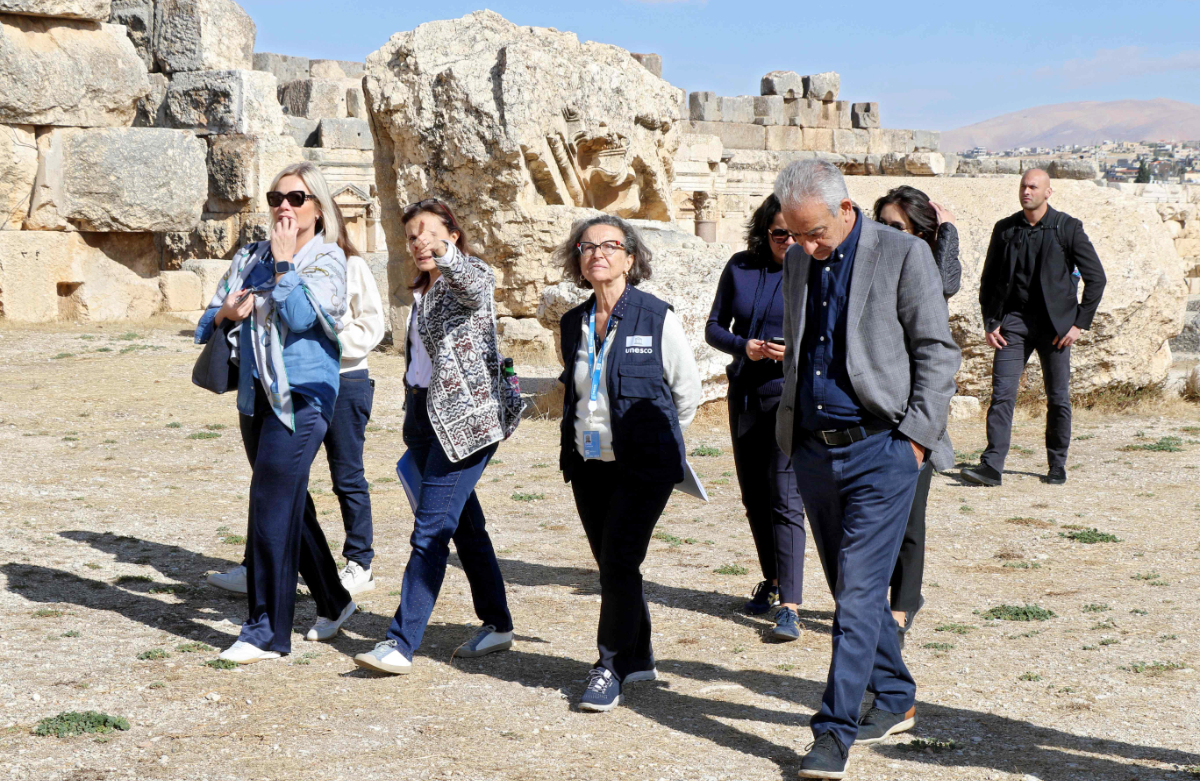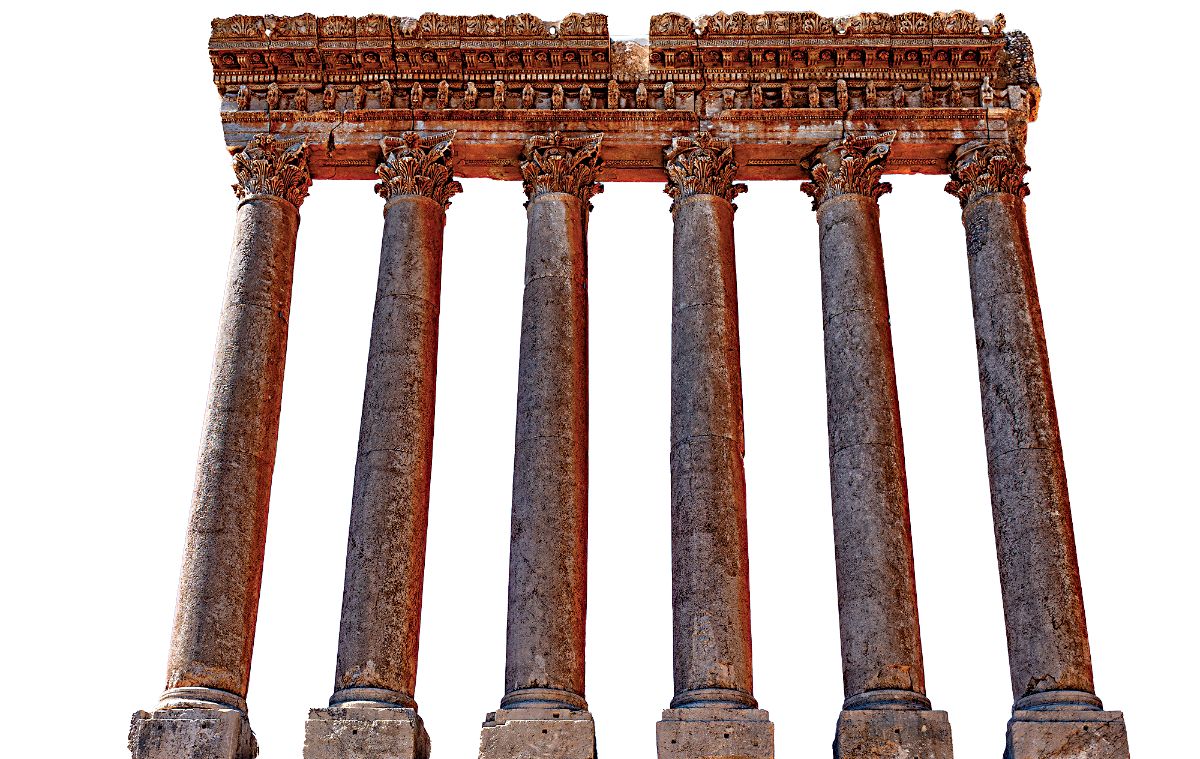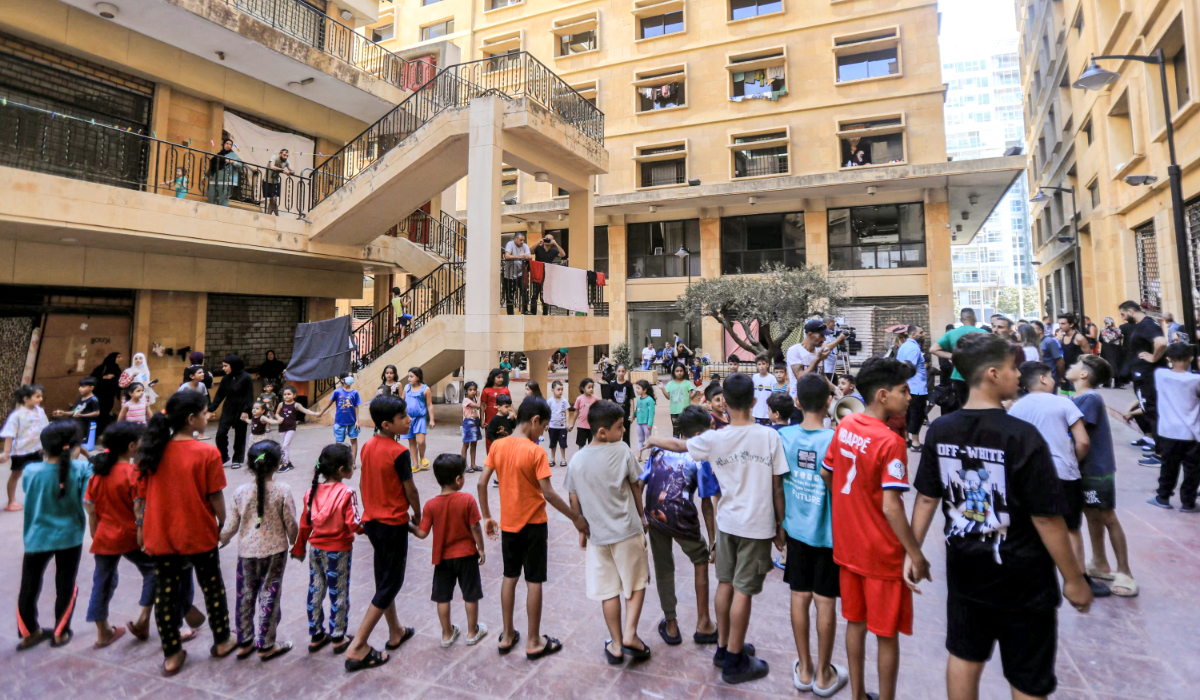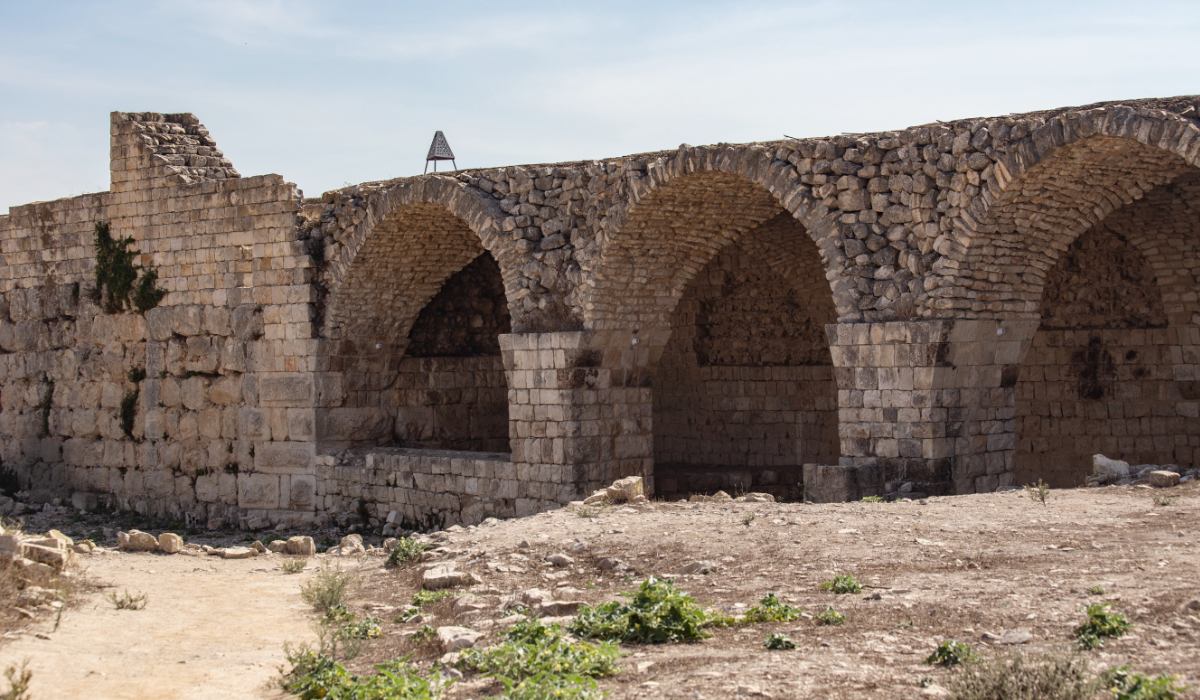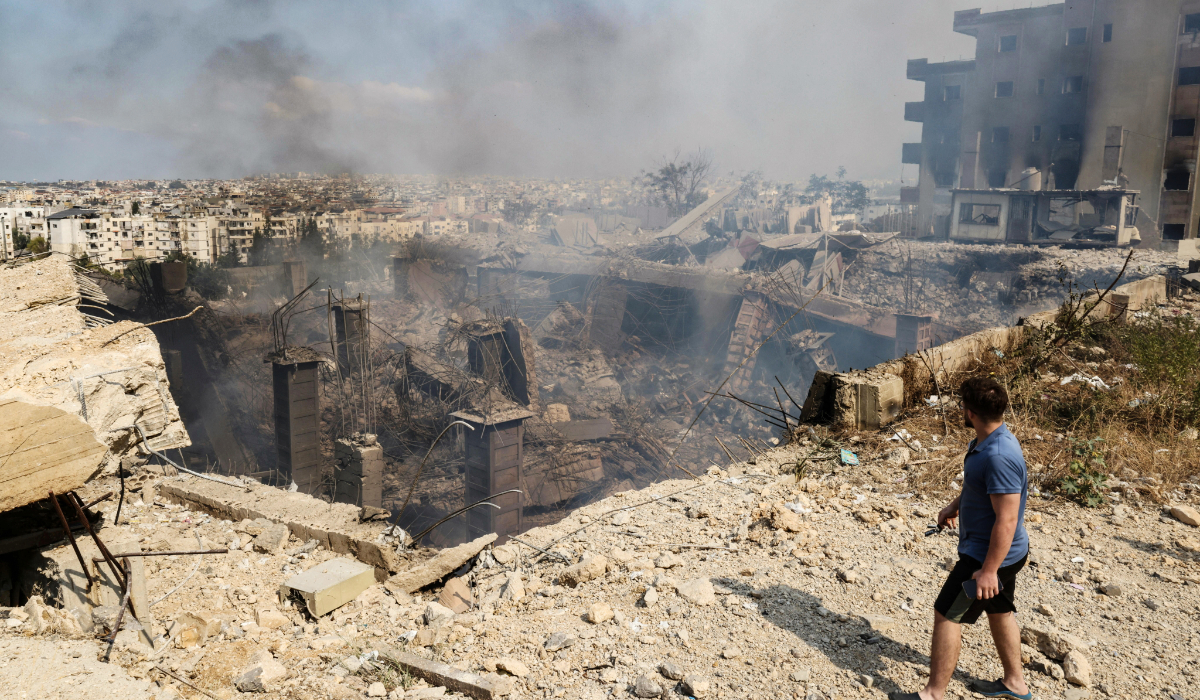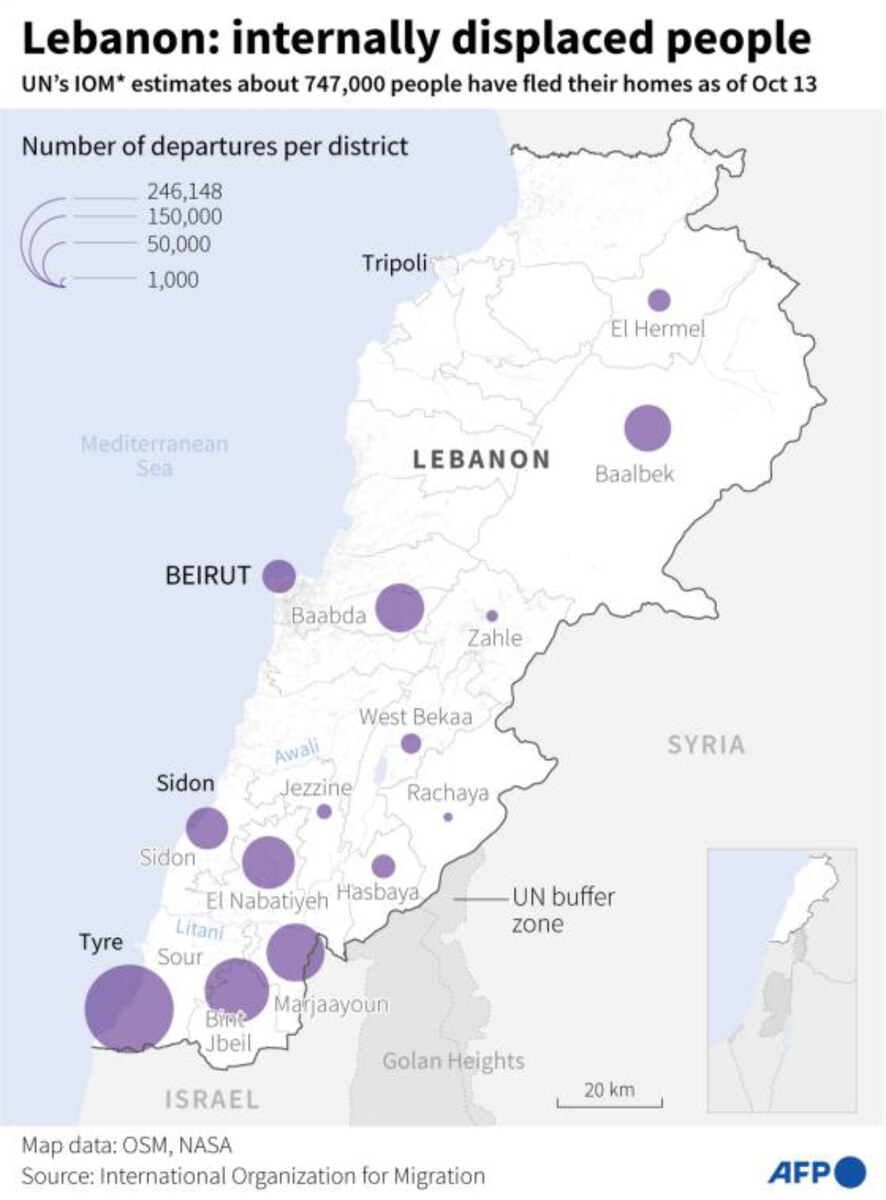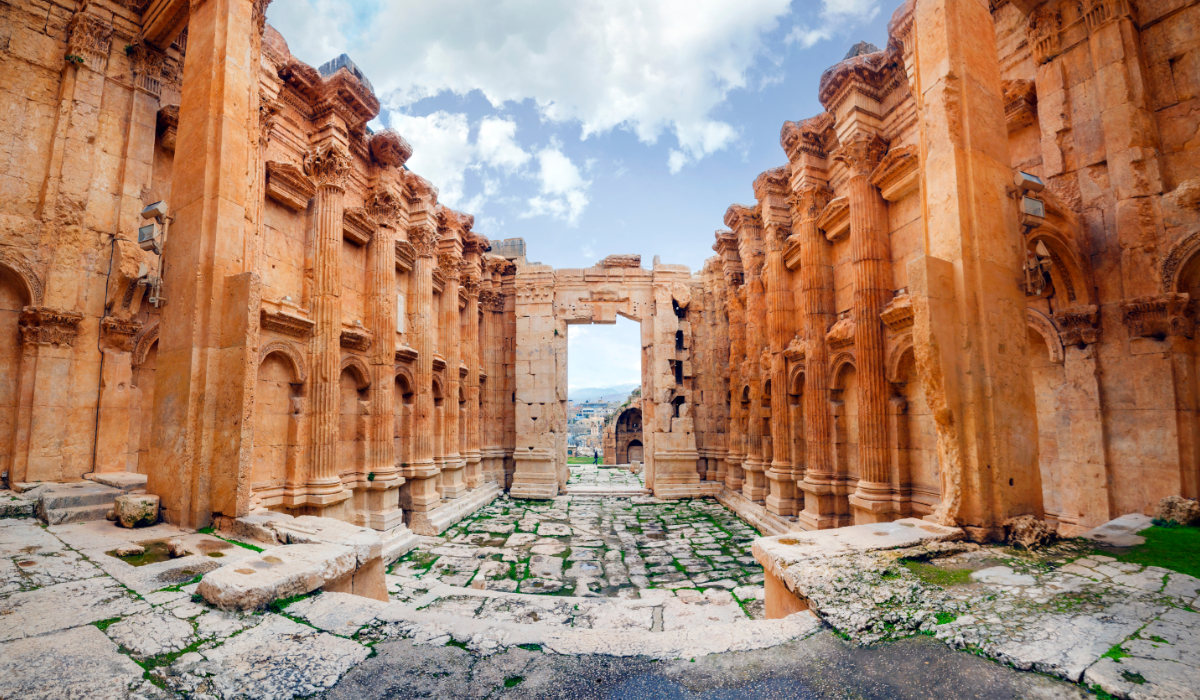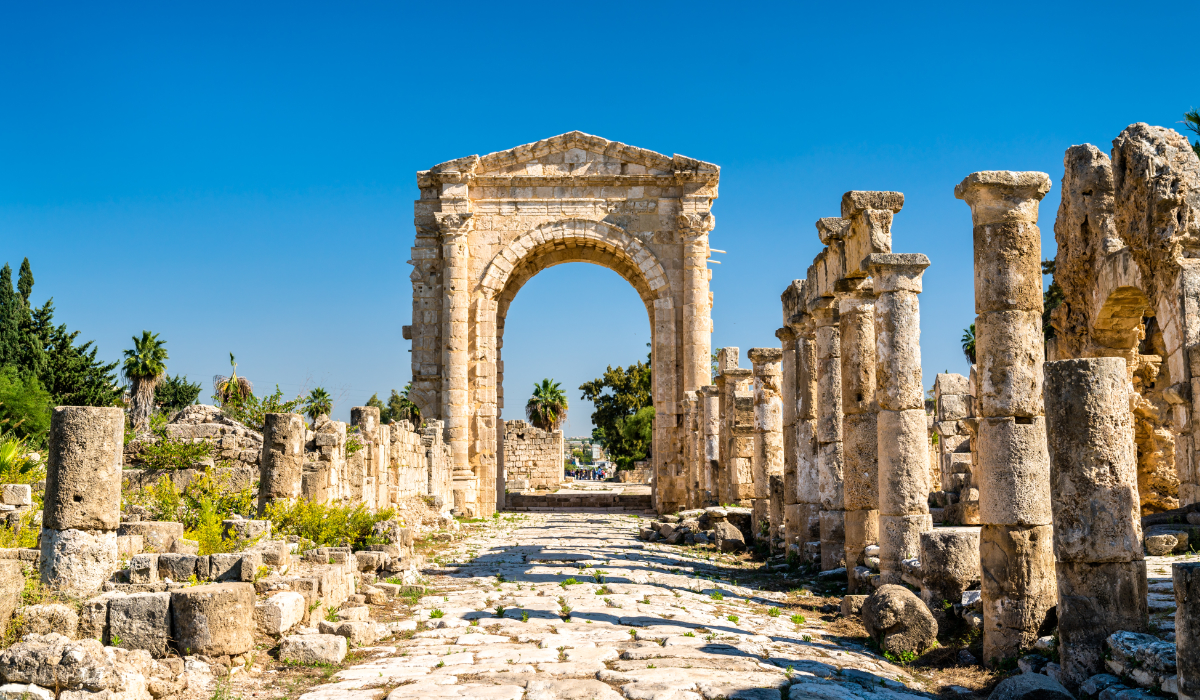A mother, weeping with joy and relief, holds her teenage son tight, as if determined never to let him go again.
“I can’t describe to you how I’m feeling right now,” she said, her face and voice reaching millions around the world through the cameras of international news organizations such as CNN.
“I honestly can’t believe it. I feel like I am in a dream. My son is finally with me. I thank God and pray that every mother will be able to feel this joy,” she added.
In the unfolding drama of hostage releases that began on Friday, such globally televised scenes of joy have become almost commonplace as Israeli families have been reunited with their loved ones, including children, held captive by Hamas since Oct. 7.
But Hunaida Tamimi is not an Israeli. She is a mother from Ramallah in the occupied West Bank.
Until his sudden release on Saturday, as part of the reciprocal deal struck between Hamas and Israel, her 17-year-old son Wissam was one of thousands of Palestinians imprisoned by the Israelis, many without charge or trial and some of whom have been locked up for years.
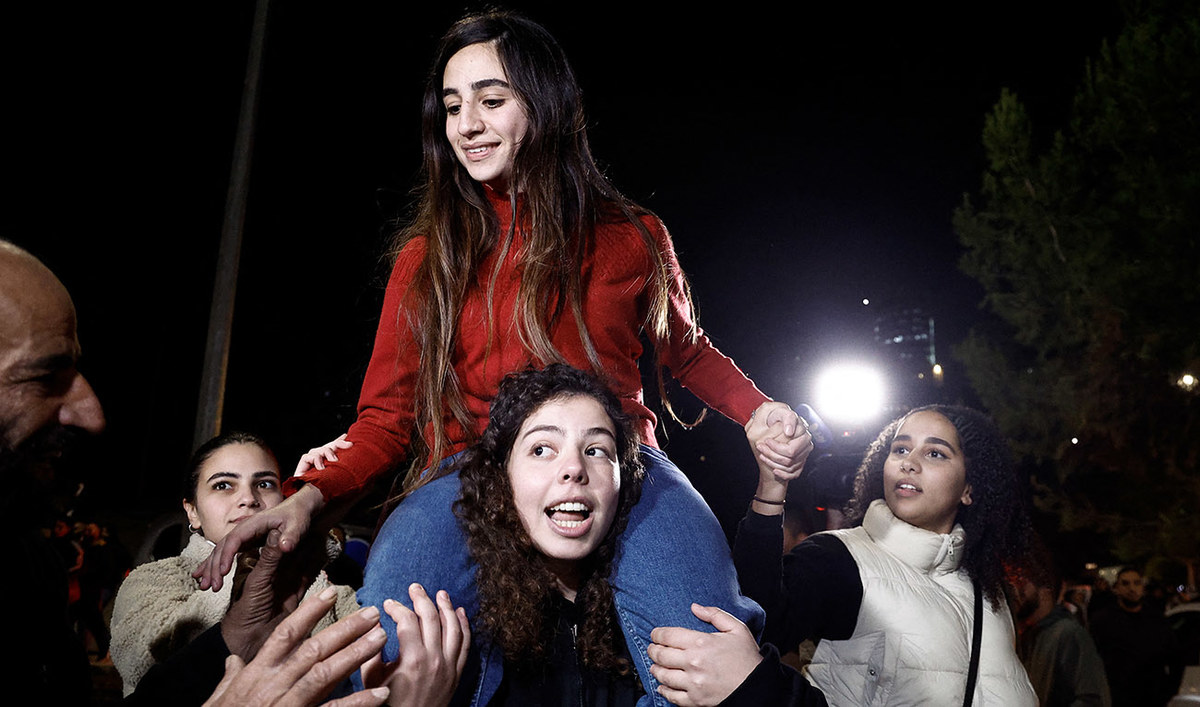
Newly released Palestinian prisoner Rouba Assi is carried by supporters during a welcome ceremony following the release of prisoners from Israeli jails in exchange for Israeli hostages held in Gaza by Hamas since the October 7 attacks, in Ramallah in the occupied West Bank on November 28, 2023. (AFP)
In a breaking-news report screened by CNN on Saturday, the American reporter was unable to keep the sense of surprise out of her voice as she reported that “over 3,000 Palestinians are held now under administrative detention, meaning no charges have been laid against them, and no ongoing legal process.”
Suddenly, a world accustomed to hearing only Israel’s side of the complex story of the conflict between Israel and the frequently demonized Palestinians, is seeing Palestinian families for what they really are – normal mothers and fathers, just like them, trying to do their best for their sons and daughters in abnormal circumstances.
And, equally importantly, as details begin to emerge of the treatment of the thousands of Palestinians held for years in Israeli jails without any form of judicial process, the world is also seeing Israel in a new, darker light – as a state that abuses the rights of children, imprisoning them, often for years, without charge or trial.
Israel, caught flat-footed by the sudden media interest in the other side of the story, has made efforts to keep news crews away from released Palestinian prisoners and their families, but with only limited success.
In East Jerusalem, where Palestinians have been ordered not to celebrate the homecomings publicly and threatened with hefty fines, a Sky News team was turned away by police officers as detained minors returned home at the weekend.
Eventually, though, the news crew found a way through the narrow streets to talk to Ghannam Abu Ghannam, 17, who had been held for a year, without charge, for allegedly throwing stones.
He said: “Prison was humiliating. They came in and beat us ever since the war began. We were treated like dogs.”
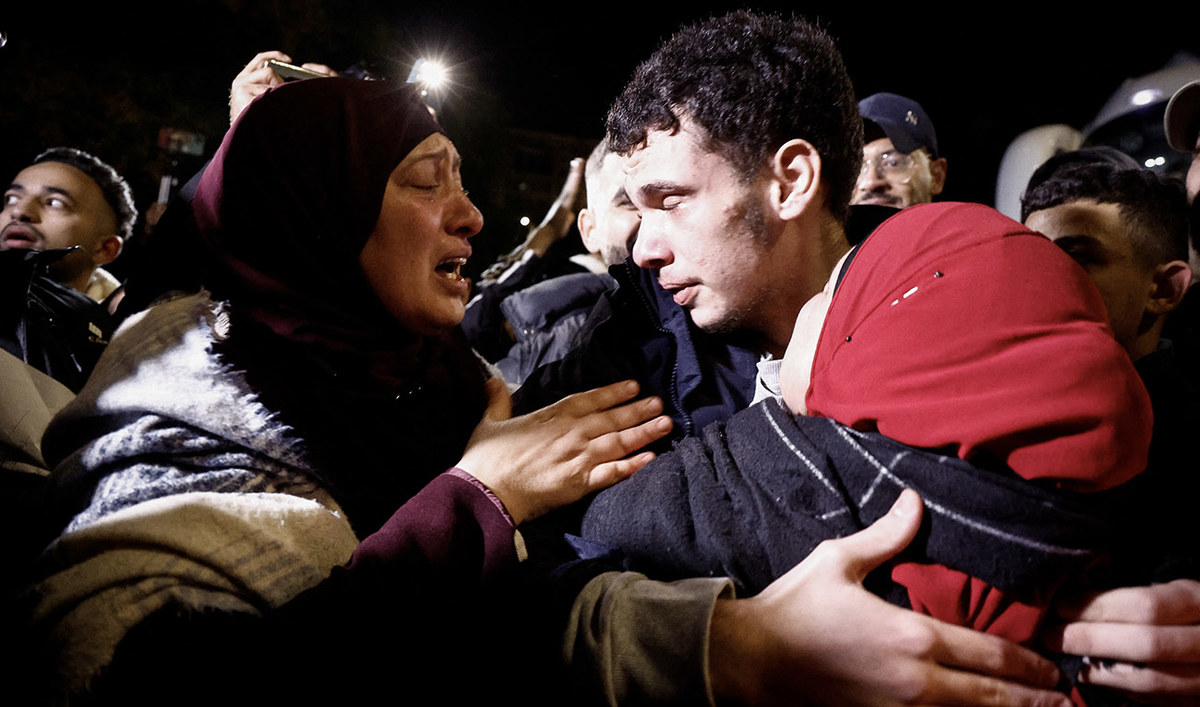
Newly released Palestinian prisoner Rouba Assi (R) hugs a relative during a welcome ceremony following the release of prisoners from Israeli jails in exchange for Israeli hostages held in Gaza by Hamas since the October 7 attacks, in Ramallah in the occupied West Bank on November 28, 2023.(AFP)
“Prison was humiliating. They came in and beat us ever since the war began. We were treated like dogs.”
The disgraceful treatment of Palestinian children detained by Israel may be coming as a surprise to many in the West, but not to international NGOs such as UK-based charity Save the Children, which has been providing support to Palestinian children affected by the ongoing conflict since 1953.
The charity, which is currently running a Gaza appeal to raise money for emergency medical supplies, food baskets, family hygiene packs, and school-in-a-bag kits, has been attempting for years to highlight the systemic abuse of children’s rights by Israel in the occupied Palestinian territories.
In July, the charity published its latest damning report, titled “Injustice: Palestinian children’s experience of the Israeli military detention system.” It was a shocking indictment of Israel’s treatment of underage detainees, but when it was published it garnered very little international coverage.
In the light of the current releases of under-age prisoners, however, it makes sobering reading.
The report shares the experiences and voices of children, mainly boys, who were aged between 12 and 17 when they were detained over the previous three years.
Kahlil, who was 13 when he was taken, told the report’s authors that “a soldier threatened to kill me when he arrested me for the second time. He asked me, ‘Do you want the same fate as your cousin?’ as he had been killed.
“He promised me that I would have the same fate and die, but that he would send me to prison first. He told me that he’s coming back for me — and every day, I wait for that day to come.”
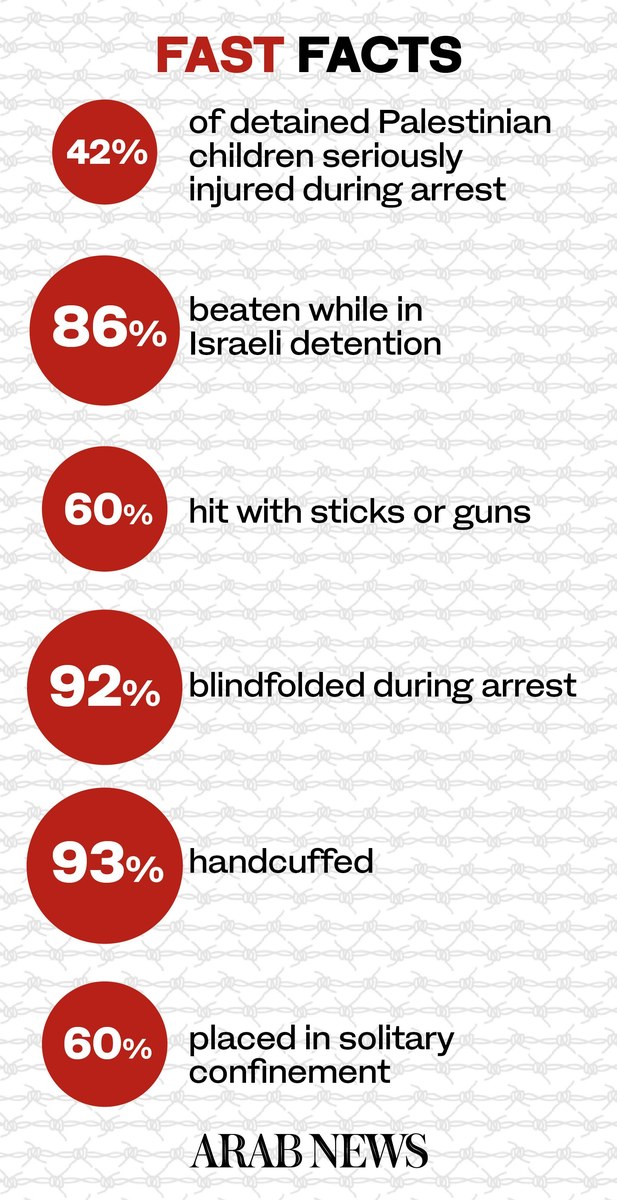
Other children released this week have spoken of suffering beatings and starvation, and increasingly aggressive treatment following the Oct. 7 attack.
“The conditions of our detention in the occupation prison were very harsh,” one of the released prisoners told the media on Monday.
“When the occupation authorities arrested me, I was 15 years old, and the detention room had 12 prisoners, even though it was intended for only six,” Omar Al-Shwaiki said.
“It was very harsh, and there are many children aged between 13 and 15 being held by the occupation.”
Save the Children’s investigation unearthed a catalogue of abuse, including that 42 percent of detained Palestinian children had suffered injuries during arrest, “including gunshot wounds and broken bones,” suffocation, and dislocated shoulders.
Nearly all had experienced “appalling levels of physical and emotional abuse, including being beaten (86 percent), being threatened with harm (70 percent), and hit with sticks or guns (60 percent).”
Three out of every five had endured periods of solitary confinement, ranging from 24 hours to 48 days, while during their arrest and detention 92 percent of children reported having been blindfolded and 93 percent were handcuffed.
Children were also regularly denied food and healthcare: 70 percent said they suffered from hunger and 68 percent did not receive any healthcare.
More than half (58 percent) were denied visits from or communication with their family while they were detained.
Unsurprisingly, concluded the report, the “enormous toll on children, including on their mental health and emotional wellbeing, continued to present after children were released.”
It said 73 percent reported suffering from insomnia, 53 percent had nightmares, 62 percent frequently felt angry, and 48 percent felt like they always needed to be alone.
On Sept. 21, just under two weeks before the Hamas attack on Israel, Amnesty International’s campaigner on Israel and the occupied Palestinian territories reported the case of a 21-year-old Palestinian who was struggling with mental health issues after having spent almost two years in solitary confinement.
Khulood Badawi said the Israel Prison Service had requested an extension of Ahmad Manasra’s isolation for another six months, “in brazen violation of international law — prolonged solitary confinement lasting more than 15 days violates the absolute prohibition of torture and other cruel, inhuman, or degrading treatment.”
Manasra was 13 when he and a cousin were attacked by settlers. His cousin was killed but in circumstances that remain unclear it was Manasra, and not his attackers, who ended up in prison, where he has been ever since.
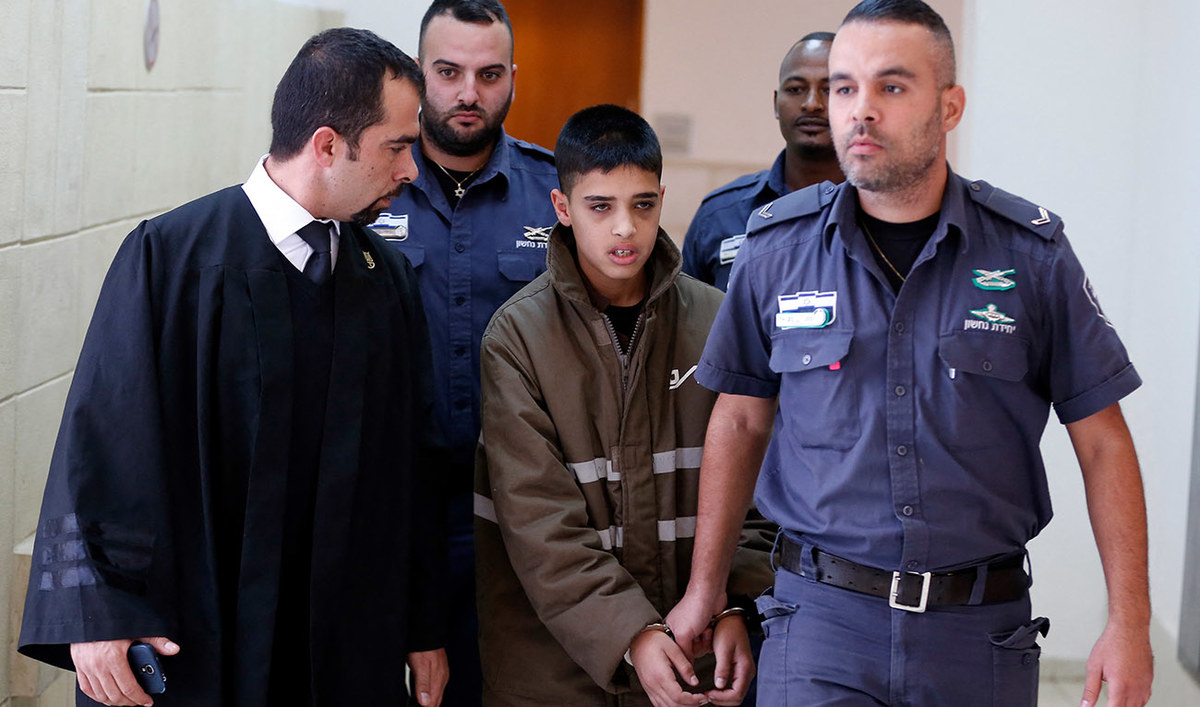
Ahmed Manasra (C), a 13-year old Palestinian boy is escorted by Israeli security during a hearing at a Jerusalem court on October 30, 2015. (AFP/File)
Israel’s Lod District Court postponed the scheduled hearing because Manasra, diagnosed with serious mental health conditions, including schizophrenia and severe depression, had been taken to the mental health unit at Ayalon prison.
“Israeli authorities have treated Ahmad Manasra with inhuman cruelty, intent on pushing him past breaking point,” Badawi added.
“He is now so gravely unwell that he could not attend his own hearing.
“Yet when Ahmad is discharged from the clinic, prison authorities will return him to solitary confinement and reschedule the court hearing. Ahmad’s nightmare goes on and on.”
He is not alone.
On Nov. 20, while negotiations for the release of prisoners in exchange for Hamas hostages were still underway, B’Tselem — the Israeli Information Center for Human Rights in the Occupied Territories — reported that, as of the end of September 2023, among the 4,764 Palestinians being held in detention or prison on what Israel defined as “security” grounds were 146 minors.
Although Israel’s secretive military courts system makes facts hard to come by, some agencies believe at least one in 10 minors, held for months or years, are never charged or tried.
On Sunday, Save the Children revealed that “prior to the ongoing escalation, about 500 to 700 Palestinian children were subjected to the Israeli military detention system every year.”
Since Oct. 7 alone, around 145 Palestinian children had been detained by Israeli military authorities.
“A large number are being held without charge, trial, or due process guarantees, which does not meet international juvenile justice standards,” the organization said.
“Palestinian children are the only children in the world who are systematically prosecuted in military courts, with an estimated 10,000 Palestinian children held in the Israeli military detention system over the past 20 years.
“Denying children access to legal representation and to see their family, are both longstanding measures imposed by Israeli authorities,” it added.
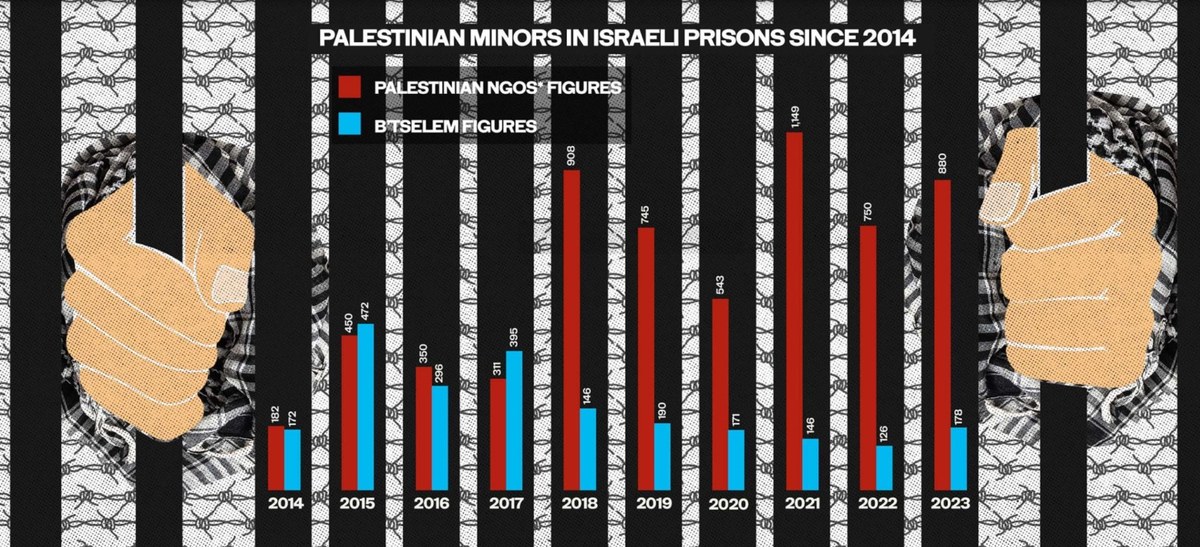
In July, the UN Human Rights Council received a report on Israel’s behavior from Francesca Albanese, special rapporteur on the situation of human rights in the Palestinian occupied territories.
Albanese told the council that since 1967, Israel had detained approximately 1 million Palestinians in the occupied territories, “including tens of thousands of children.” Currently, she added, there were 5,000 Palestinians in Israeli prisons, including 160 children, of whom more than 1,000 had been detained without charge or trial.
In short, she noted, the occupied territories “had been transformed as a whole into a constantly surveiled open-air prison,” and Israel’s unlawful imprisonment practices were “tantamount to international crimes,” warranting an urgent investigation by the prosecutor of the International Criminal Court.
More than eight years ago, on April 17, 2015, a day designated Palestinian Prisoners’ Day, the UN received and published a report on conditions of Palestinian prisoners in Israeli jails from the permanent observer of the State of Palestine to the UN.
The report sought to highlight “the tragic reality of the thousands of Palestinian men, women, and children who have been living under the Israeli occupation for nearly 50 years and have been subjected to arrest, detention, and grave abuses at the hands of the occupying power.”
It added: “The threat of arbitrary detention and imprisonment is constant and consistent … and the impact on the Palestinian people and society has been devastating.”
Palestinian children had been “increasingly targeted by Israeli detention,” with more than 200 detained in the first quarter of 2015 alone. Many “are abducted under terrifying conditions, most often in the darkness of night, by the Israeli occupying forces.”
Denied “basic human rights,” those that face trial are tried before a military court. More than 90 percent of children released from Israeli jails “reported suffering from torture and ill-treatment during interrogation and detention.”
Yet the illegal treatment of children by Israel has been an open secret for years, to which the world has turned a blind eye.
“The West has granted immunity to Israel for decades,” Salwa Duaibis, co-founder of Israel-based NGO Military Court Watch, told Arab News.
MCW was set up in 2013 by a small group of lawyers and other professionals to campaign for all children detained by the Israeli military authorities to be granted all the rights and protections to which they were entitled under international law.
“Look at the response of the West to Russia when it invaded Ukraine, or when it annexed Crimea,” Duaibis said.
“Immediate sanctions were imposed when Crimea was annexed and within about 12 months the International Criminal Court issued an arrest warrant for (Russian President) Vladimir Putin, for his involvement in transferring children from Ukraine to the Russian Federation.
“What Israel has been doing with Palestinian children is a violation of international law and an exact mirror image of what Russia has been doing, transferring children against their will and without the consent of a guardian.
“What Israel has been doing with Palestinian children is a violation of international law and an exact mirror image of what Russia has been doing, transferring children against their will and without the consent of a guardian.
- Salwa Duaibis, co-founder of Israel-based NGO Military Court Watch
“Israel has been doing the same for over 56 years, and thousands of children have been illegally transferred.
“When it is Russia violating international law, there’s an immediate response because Russia is an adversary to the West. But when Israel is suspected of committing very grave crimes, over many years, there’s reluctance, to say the least, if not active obstruction to legal remedies because of vested interest in Israel.”
There was, she pointed out, a clear motive behind Israel’s persecution of Palestinian minors.
“Our evidence tells us that the overwhelming majority of detained children, up to 90 percent, and maybe more in some years, live within a few kilometers of a settlement.
“If you are the Israeli military commander in the West Bank, your job is to make sure that the thousands of settlers are free and safe to wander around in the occupied territory, so what you do is harass the nearby Palestinians and subject them to measures that will affect every aspect of their lives.
“So, these child arrests are part of a system designed basically to protect the settlers, which enables Israel to continue to occupy this territory and move settlers illegally into the occupied territory, at a minimum risk to their lives.”
Thousands of Palestinian children, she noted, had experienced the familiar routine.
“If Israel wanted to arrest a settler child, they would have to present an arrest warrant to the family. In the case of Palestinians, there is no obligation for an arrest warrant, they can just raid the house in the middle of the night and take whoever they want, including children.
“From there on, the child is subjected to severe ill-treatment. He or she is immediately zip-tied painfully behind their back, blindfolded, dumped into the back of a military Jeep, and then taken to a nearby military base or settlement where they are dumped for hours and hours until the interrogation center is open for business.
“That softens the child up for questioning. They are sleep-deprived, probably physically and verbally abused, did not have access to a lawyer, are not informed of their right to silence, and then are interrogated without the presence of an adult guardian.
“So, it is not a surprise that many of these children, who are denied their protective rights, confess.”
Some activists working to protect the rights of Palestinian children are cautiously hopeful that the revelations of the past few days could lead to change — Save the Children has called for an immediate moratorium on Israeli military authorities arresting, detaining, and prosecuting children until comprehensive reforms to the system are made.
“We welcome the news of the release of some of the Israeli children held hostage in Gaza, and those Palestinian children held in Israeli military detention so far,” Jason Lee, the charity’s country director in the occupied Palestinian territory, said in a statement on Sunday.
“They have experienced horrors no child should ever endure and must be provided with support to help them start the long road to recovery.
“However, this exchange is just the first step needed in addressing the decades-old protection crisis of children, which can no longer be ignored.
“A lasting ceasefire must be agreed immediately, all hostages in Gaza must be released, and the appalling emotional and physical abuse of Palestinian children in detention must end.”


